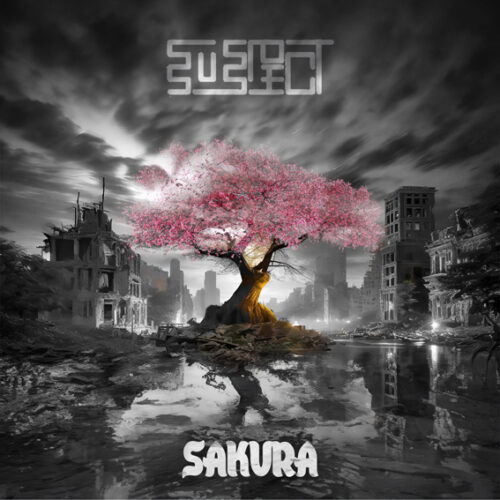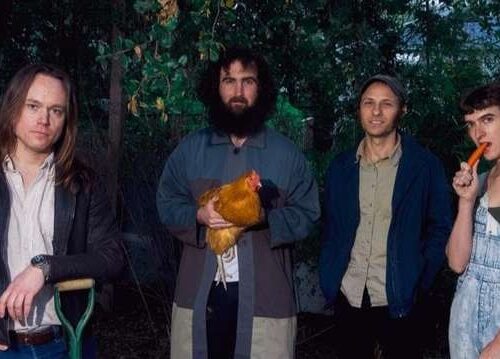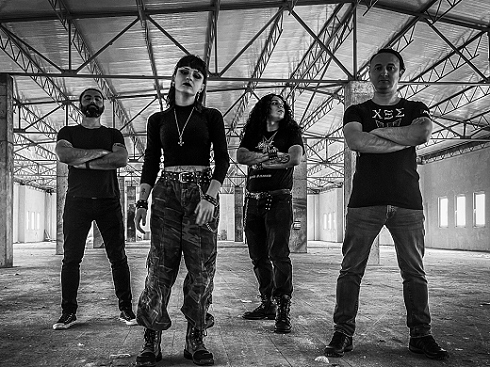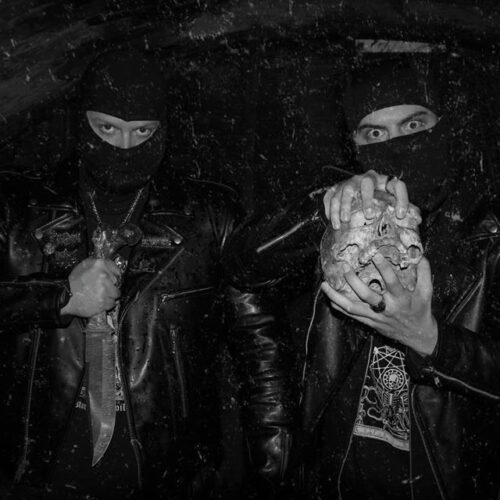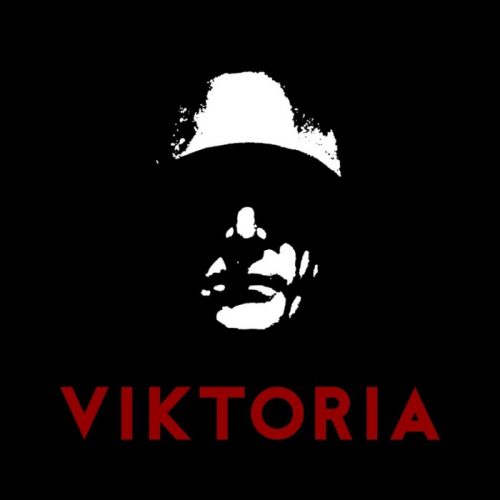AFTERMATH
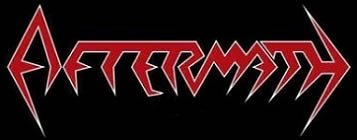
Aftermath is an excellent 80’s thrash band that recently got back together with the original line up and recently released a brand-new concept album. Here is an interview I did recently with singer Kyriakos “Charlie” Tsiolis.
Where were you born and where did you grow up?
Charlie: I was born in Greece and then within 11 months of my birth, we moved to Chicago. I grew up and still live here.
What sort of kid were you growing up? Was your family a big family?
I don’t know what to say or how to answer this. I was a kid that never took shit from anyone. I remember hating school, going to sleep early, being told what to do – the list goes on and on. I got into a lot of fights when I was young – usually defending someone else. There was this kid named Freddy in grade school that was the school bully. He said something to me one day in class, I got so angry, I just punched him in the chest as hard as I could – he fell off his chair. He never tried that shit with me again. We actually became friends after that. I remember driving my parents crazy. I was always in some kind of trouble. At the age of 10 we derailed a train one time that was probably the worst thing I did. The stories can go on for days. But I also discovered music pretty early and knew what I wanted to do at a young age.
My immediate family was my parents and my brother. Almost all my uncles and aunts and first cousins live in Greece. I have an uncle and two first cousins who live in New York City.
So were you big time into music say in your teenage years and if so, what bands did you get into?
Yeah big time into music is putting it mildly. I was obsessed, it was like nothing else matters and it started with Kiss at the ripe ole age of 7. The teen years were even more intense and the music I got into kept getting heavier and heavier. By the mid-80s I went completely underground and hated anything that was mainstream. Like I said Kiss got the ball rolling, but then I discovered Van Halen. In the early 80s it was the NWOBHM, Motörhead etc.
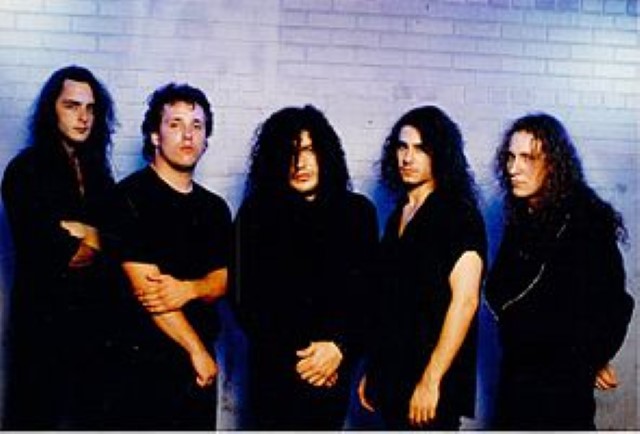
Was there a healthy metal scene in Chicago? What stores stocked metal back then?
Chicago had a great metal scene back then. There were so many great bands playing their own style. None of us sounded the same. That made our scene unique – there was no CHICAGO sound.
We had great independent record stores. My favorite is still around – Rolling Stone was a great record store. Glad it’s still around. Hopefully it won’t fall victim to what has happened to so many others.
So, when did you get the itch to join or to form a band?
I “got the itch” at around 7 years old. Like I said it all started with Kiss. Most kids that got into Kiss wanted to become rock stars. When I got a little older, it wasn’t about being a rock star. I wanted to be in a band not just hey I want to be famous. It was about being part of a great band. When I got into heavier bands, I went from wanting to be a guitarist to being a vocalist. I didn’t have the patience be a guitarist.
So, did you ever take any singing lessons?
No, never took lessons.
How would you rate yourself as a singer and who are your favorite singers?
This is a very unique question. For me, my vocals and lyrics are like my hand, a tool to spread the truth. I never thought of rating it from a singing point of view. So rating my own voice is hard to do, especially when I don’t view it on a rating system. Freddie Mercury (Queen) is the greatest but I’d never want to have sing like him. Freddie is a favorite as is Tom Araya. DLR is up there because of his tone and phrasing. (I assume he means David Lee Roth from Van Halen-cf).
So, was there chemistry early on with some or all of the band members and what were the early practices like?
There was chemistry day one with Steve, Ray and me. The same chemistry we have today among the three of us. It felt totally natural for us from the first rehearsal. Our first bass player Adam was a skinhead. He had the look and played that way also. What I mean is he had the punk vibe and playing ability. Therefore, in the early days he fit in because our style was way more basic – we started out as a crossover band and the four of us worked well together. Rehearsals were a party back then, we usually rehearsed only once a week. There was a lot of drinking and smoking weed and really loud music. As the band progressed, we added John Lovette first on bass, then on as a guitarist. He wasn’t a bass player, but we thought he was. That’s a different story for later. We have gone through a lot of bass players. Chris Waldron played in the band longest and played bass on the Eyes of Tomorrow record. We added George Lagis on bass, and he is on the new record. We went back to a four-piece on this record and the vibe today as a four-piece is great. Like the old days. Less of a party at rehearsal this time around. But still smoking.
So how early on did the band start to write original songs and what do you remember about this time period?
We started out writing our own songs. At first, Steve and I wrote our earliest material on my old acoustic guitar. Those songs came easy. All I remember is that we wanted to write the fastest songs ever. Our entire goal was to be faster than any other band. But we still wanted it to be comprehensible. The early material was really catchy and straightforward compared to what we started writing later on.
We would write the song and play it for Ray at rehearsal. He added the drums; he is such a great drummer and a great writer. I call him a writer because his beats are so important to the sound of the band.
So, to backtrack a bit, how did you discover the whole underground scene and back then was there many stores that stocked underground metal? How about clubs, did most touring bands play Chicago back then?
Back then, it all started with Venom. I remember hearing Venom and thinking what the fuck is this? Word of mouth was the key. Then tape trading was the rage. Zines were important in getting the word out. We had some great record stores back in the day. We also had a few really cool clubs that supported underground bands. The scene was amazing – new and totally creative. Chicago is a huge metal market – every band toured here. Those early days were the best.
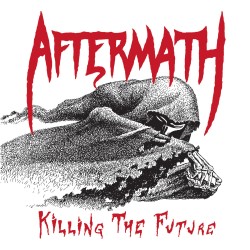 So then, the band was familiar with the whole fanzine and tape trading thing. How soon in did you as a band decide to go in the studio to do a demo?
So then, the band was familiar with the whole fanzine and tape trading thing. How soon in did you as a band decide to go in the studio to do a demo?
We were really into zines and tape trading even before the band formed. In a way, zines and trading made bands want to record a demo because we felt that we could get it out to the fans. Without the zines and traders there would be way fewer bands recording demos because what would be the point if no one would hear them. Demos were made to get record deals before the thrash scene. With the birth of the thrash demos became important beyond a way for a label to hear your music. Instead, demos could reach thousands of fans just like a real release.
So, we wanted to record right away, which we wouldn’t have done if it wasn’t for the zines and traders. We formed on October 31, 1985 and recorded our first demo in 1986. It was a simple four song live recording – like if it was recorded in 1960s. It was a great first experience in the studio and aggravating at the same time. We wanted to sound pro, but it didn’t come out the way we wanted it to. I think we only made 100 copies and never really sent it out back then. In 1987, we recorded Killing the Future at Solid Sound Studios on 24 tracks and got the sound we wanted. The production sounded like a real record not just a demo.
The scene was so big that demos allowed the band to get fans around the world. All because people like you Chris that supported bands with zines not to make money, but to share great music. (you got that right-Chris).
Thank you. Now moving past the 1st demo then, your 2nd demo, what were the reviews like back then and what were the live shows like for the band?
When we wrote Killing, we wanted to be the fastest band ever. I think we achieved our goal on it. The response was instant. People loved it from the beginning. Two tracks were selected by Bernardo Doe at Metal Forces to be included on their compilation “Scream Your Brains Out”. That was their first and only comp. It was so cool to be picked to be one of only 5 bands from all over the world. Think about it, MF was huge at that time and they got thousands of demos to pick from and they pick two tracks from Killing – that really says something about how good that demo was. Other major zines at the time raved about it also. The buzz it created led to some label offers as well. The live shows were intense. The music was meant to get the crowd going and for the pits to be extreme. The energy from the shows was amazing. The pits were violent.
I remember that comp release. Now did that lead to record interest at the time?
The comp led to a lot of attention from fans and labels. We got a lot of offers around that comp and demo release. We turned down all of them. When you are that young and get an offer you either jump at the first one or reject them waiting for the better deal. We decided to wait.
How long did it take to gather material for the “Words That Echo Fear” demo? What was the morale of the band like then?
After we recorded Killing, we added John Lovette. We were changing as a band around that time and John’s writing was completely different from Killing. He had these amazing heavy riffs. He was dark and technical as a writer. The Words demo was a reflection of the changing style because of John’s writing, but also because we all wanted to slow it down and write slower, darker and heavier songs. The crossover material was gone.
We had a lot of material for the Words demo, selecting the four songs was the hard part. We were excited at that time about the songs we were writing. In the studio, we were blown away when those songs were being played back over the studio speakers. The middle section of Words that Echo Fear sounded epic. We couldn’t wait to release that demo.
We were on the forefront of the technical/progressive thrash sound with that demo.
Was the plan back then to spread this demo through the underground and get a record deal or did you still wish to wait before doing that?
The plan was to release the demo to the underground and build the buzz that would lead to the right record deal. We had lots of offers like I said during the Killing days and we were still getting offers and interest while recording Words. We felt that Words would get the right deal on the right label. But we didn’t shop it to labels right away, we let the underground buzz grow. Then the labels noticed.
Before we go any further, please tell the story of how band member John Lovette joined as it’s kinda funny.
You can’t write this kind of stuff because no one would believe it. We got rid of Adam after Killing. The band was writing more complicated material and Adam couldn’t keep up. So, we started a search for a bass player. We got the word out and a few dudes came by to tryout. A friend of Steve’s brought John down to the basement. John plugs in and it was nuts. He was the fastest bass player ever. He played the bass like a guitar. I mean I never heard anyone play like that before.
So, we got the perfect technical bass player at least we thought we did. Our new bass player John Lazette. A few months went by and John said guys I’m moving to California. We were shocked. At this point, we were a four-piece. Looking for a second guitarist. John knew we were looking to make the band a five-piece. He never said anything about being a guitar player during this search. I mean he never mentioned it. Instead, he says I’m moving. During that meeting, he said he was a guitarist and since we were looking for a second guitarist, it was time for him to leave. We flipped out. We said, dude what the fuck are you saying? You are really a guitar player and you have been playing bass never saying anything about not being a bass player?
He said when we were looking for a bass player, he wanted to be in the band, so he never said anything after he got the gig. We were blown away by this, I think anyone would be. The guy knew we wanted a guitarist and never bothered to say hey I’ll switch to what I really play. It explained why he played the bass the way he did. He played it like he was playing guitar. All technical no feel or groove. We said John play guitar and we can find a new bass player. He said cool I’ll stay and by the way, my last name is Lovette not Lazette. So, about a year into the band we find out our bass player John Lazette was really a guitar player named John Lovette. Is that crazy?
Big time. Now you signed onto Roadracer who approached you for a demo deal that resulted in a live 4 track demo. Tell me a bit about all this.
We got a demo deal with Roadrunner. We went into a studio to record the demo quickly. That demo unlike the others was meant only for the label. That deal didn’t work out. Not really sure what happened with that, but someone at Roadrunner gave the demo to the owner of Big Chief Records. He loved it and offered the band a deal. Which we signed.
Did they give you a budget? How many records was the deal for?
Big Chief was a new label that had major label distribution through WEA – Warners/ Elektra and Atlantic. The owner of the label was a rich kid whose dad was financing the label. I think his dad was a NY real estate developer. We got a two-album deal if I remember correctly. The budget to record was like $10k. Which wasn’t bad for an indie label back then. The major label distribution is what sold us on the deal. We thought with a new label and WEA distribution that this was the right deal to sign.
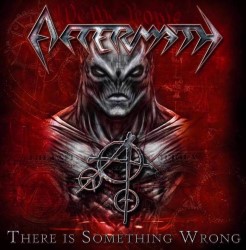 Then all the problems began, and the label eventually folded while you were still recording it. It took 4 years to see the light of day am I correct? Why didn’t some other indie label pick you up?
Then all the problems began, and the label eventually folded while you were still recording it. It took 4 years to see the light of day am I correct? Why didn’t some other indie label pick you up?
Yeah, we start recording the record and we were half way done with it or something like that. The studio had received something like 25 to 50 percent of the cost by that point. Then we hear the label went bankrupt. What really happened is that the owner was overspending, and his father decided to pull the plug. He wasn’t overspending on the bands – more like the office and shit like that. So, we are now stuck without any money and we need to convince the studio to let us finish the record. They go along with us finishing the album but refused to give us the masters until they were totally paid. It was like 5k we still owed. Doesn’t seem like it was a lot of money now, but it was for us back then. It took years to pay it off.
We never shopped it to any label. We decided that we would control it. We waited for years for the right deal and it was gone. We felt like fuck labels – we will release it on our own on our own terms. We did a pressing and distribution deal after the first pressing with Feedback Distribution and their in-house label Thermometer Sound Source to get it in stores. They also went bankrupt. We have reissued that record with Black Lotus Records in Greece in 1998. Area Death Productions in China as part of the 25 Years of Chaos box set in 2010. Shadow Kingdom Records in 2015 reissued it on CD in partnership with Zoid Entertainment (our label). It’s my favorite version – remastered by Pail Logus and with an expanded booklet and we added the logo to the cover not block letters. It’s great. I think it’s the most reissued record in the history of music.
Before we go further what is the whole issue with you guys and Interscope Records and Dr. Dre over the ownership of the name at the time?
It’s a story I hate talking about because it still gets me angry. But I know it’s part of the band’s history and that it is unique. To understand the story and timeline I need to start in the beginning, I guess. We decided to a get a state and federal trademark for the name Aftermath. Back then, no one did that. Bands didn’t bother getting trademarks or didn’t have the money to do it. Our lawyer at the time suggested we trademark it. It cost something like a grand to get it done. I remember thinking this was worth the money to protect us. Man, I was wrong. We got it sometime in the late 1980s. In 1996, I get a call from a lawyer named Pete Paterno. He said he wanted to license the name for his client a small R&B label. The story made no sense right from the start.
Paterno was Metallica and GnR’s (Guns n Roses-Chris) lawyer. He had no small clients. He lied. His client was Dr. Dre and the small label was Aftermath Entertainment. We told him we weren’t interested in granting a license. We uncovered the truth about who his client was and decided to sue them for a TRO and permanent injunction. We figure the law would protect us. We have a damn trademark that we paid for just for this reason we figured it was a guaranteed. The hearing lasted 3 days and the judge decided to not grant the injunction. He said we could go to trial. The trial required we post a bond that we couldn’t afford and legal bills we couldn’t pay. Instead, my brother worked out a deal. We wouldn’t continue with the lawsuit (which we convinced them we would) and Interscope would give us a record deal. They thought we wanted a deal to release an Aftermath record. Instead, we gave them a record under the name Mother God Moviestar. They freaked when they got it. They didn’t understand why we didn’t record a follow up to Eyes of Tomorrow. They couldn’t comprehend we did it on principle.
That case made me feel that the judges and the system are rigged. There was no way we should have lost that injunction. What the fuck is a trademark worth if it doesn’t protect you? It’s bullshit. That case is taught in law schools and they agree with us.
Yes, that sucks. So, you finally released your album, Eyes of Tomorrow” on Zoid Recording. Now the thrash scene had changed by 1994. Gone was the speed and intensity of most thrash bands, replaced with groove and much more commercial oriented music. So how was your release received back then?
Chris, this question sums up part of the problem with the date of the release. Not only was thrash changing, but it was dead also in a way. Some bands released great records, but the golden era was gone by 1994. Some blame grunge, that’s part of the problem and the other part has nothing to do with grunge but with what you said. A lot of the bands had written their great records years before that and by 94, they were losing what made them great. The other problem was that we wrote a record between 1988 and 1990 that was a trailblazing technical/progressive thrash record and by the time it was released other bands had put out technical thrash records. What I am saying is that instead of it being considered by some as a pioneering record, some have compared us to Coroner or other bands. When in reality we weren’t influenced by any of them.
So, were sales of your release any good? How about reviews and live shows?
The sales of Eyes of Tomorrow were good considering when it was released and how it was released. We put it out on our own initially with no radio promotion or marketing behind it. We didn’t even have a tour to support the release. It was all based on word of mouth and the band’s fan base that we had established. When we partnered with Feedback to distribute the record, we got it in stores and some marketing through them. But, nothing like you would want for a debut. It kept on selling with the reissue on Black Lotus in 1998. The reissue in 2015 was a limited run on Shadow Kingdom for CDs – I think that pressing sold out. We still sell a good number through downloads on Apple Music, Amazon, etc.
That record would have done really well if it came out in 1989 with real label support and a tour behind it. The reason it has continued to sell is because the writers have praised it from the beginning. It is so cool to see it on top ten lists despite the limited copies that are out there.
How was the morale of the band during this time period and did anyone leave or did you keep the same line-up?
You know I think we were pissed more than anything. The whole thing sucked. We get this deal that we thought was the one that would be the right fit. A label that loved the band with real distribution and out of nowhere they are gone. Taking four years to pay off the studio caused some stress. But we all knew the record was great and we needed to get it released. So that kept us going. The five of us that recorded the record Eyes were around until after the release. We broke up in 1996, so we stuck it out.
So now before you broke you did a demo in 96. What was the musical style on it, and did you get any label interest from it?
After we released Eyes, we record that four-song demo in 96, but never shopped it. We cranked it out quickly. The music was extremely progressive & somewhat technical even beyond Eyes. After all, it was 8 years after we started writing the Eyes record, so the songs on the 96 demo naturally were different. This band went from a crossover band to a technical/progressive one pretty quickly when you think about it. It wouldn’t be like us to repeat the Eyes record. We never shopped it because the whole Dr. Dre lawsuit came at that time and we never got around to shopping it.
So now, we come to the name change. How did you come up with it and for those who don’t know what style of music was it?
Like I said earlier the deal was for Aftermath on Interscope, but we gave them a Mother God Moviestar record. The name was long and completely different and a name no one would ever use. I was sick of the confusion with the name Aftermath. There have been a lot of bands that tried to use Aftermath as a band name. Even today, you see new bands using it all over the world, most are metal. I don't fucking get it; don't they use Google? Why the fuck would you want to start out using someone else's name. So, Mother God Moviestar I was sure no one would ever use it, because I made it up.
I gave it a meaning – like a hidden message – Chris you need to figure it out. The music was heavy but not thrash. It was progressive and different from anything we did before. We added a girl to for backing vocals a dj and we remixed our own songs on the same record. It was a combination of electronica and metal – that would be the best description.

How was this release received? You were around with that band for 3 years what led to the breakup of that band?
We wrote this really out there record. It really didn’t fit into any genre or category really. But we wrote a record we wanted to write and made a major label release it. Ultimate creative control – how many bands can say that with major labels? We did one tour with the Genitorturers. Not the greatest match from a style perspective, but it was like 25 cities which was a great experience. We shot our first video ever – for a track called Subway. That was cool also. After we got home from the tour, we all kinda felt that it was time to end it. We weren’t going to write another MGMS record and we weren’t about to reform Aftermath. The time was right to end it.
So, what did you do after the band ended?
A few years went by where I did nothing in music except for the Black Lotus Records reissue of Eyes in 1998. Then in early 2000 or so, John Lovette was working at Guitar Center with this dude Kevin Cherrello. They wanted to form a band and wanted me to sing. I wasn’t into doing it. But I went by to check out what they were playing. The music was nothing like Aftermath or MGMS. Kevin had written all these songs that were super catchy way more commercial or accessible than anything I had ever been involved in. But it was great. Kevin and I shared vocal duties. He wasn’t a metal fan, which made the music standout from other bands. The first 3 song demo led to a ton of major label interest. Matt Walker from the Smashing Pumpkins, Filter and Garbage played drums on it. Those three tracks were great. We later recorded another bunch of songs. At that point, Joe Nunez (Soulfly) was playing drums in the band. We almost got signed by Matt Pinfield to Columbia. Bad timing I guess because Matt was let go by the label before we could sign the deal. Eventually, we released a vinyl on Floga Records.
The band was called Stripping the Pistol.
So, is that band still around?
No, it’s not. We do have a Facebook page and it’s kinda wild how many requests we get for a reunion.
So, tell me how Aftermath got back together and how many are from the former line-up?
In 2010, we released 25 Years of Chaos a box set on Area Death Production (China). As part of the release, we spent a ton of time putting together the DVD. We also did an interview on the DVD. We talked about getting back together at that time, but we hadn’t talked to Steve in years. Four years go by and we got an offer to play Headbangers Open Air in Germany and one to do Ragnorakorr in Chicago. We were reissuing Killing the Future on Divebomb and Eyes of Tomorrow on Shadow Kingdom at that time. While working on Killing, I finally listened to that demo for the first time since it came out basically. I fell in love with those songs. The offers to play those fests were cool and especially with the 2 reissues that were coming out. I talked about it with my brother Peter who manages us, and we thought it would be the perfect time to get back together to do the shows, release the records and have some fun. No pressure. We weren’t thinking about writing a new album, it was a chance to play a gig in Germany. What a way to spend a weekend right?
We knew John would say yes. We called Ray and he was in. We got a hold of Steve and he said yes – we weren’t sure what he would say. But he was excited about it. Chris Waldron who played bass on Eyes wasn’t into playing music. So, we figured we should call Adam – our first bass player. He played on Killing and we planned on playing those songs for the first time since 1987. He was in. We got back together as a five-piece. The original four members and John Lovette who joined the band after Killing but was on the Words demo and Eyes record.
We rehearsed for several weeks and realized Adam couldn’t do the Eyes material. We needed someone that could play all the material. We brought in Eric Alvarez on bass. And we did our first reunion show. But before Germany, John had some personal issues and left the band. We went to Germany as a four-piece. It felt great being a four-piece again like in the beginning plus as a four-piece we had a different vibe live. We decided to write one new track. It felt so natural, we kept writing.
Eric moved to Vegas and wanted to stay in the band. He wanted to be on the record, but that couldn’t work. We added George Lagis on bass. He is on the new record. It’s a great fit and he does backup vocals along with Steve. We never had backup vocals like this before it adds a different dimension.
We have returned to the original lineup from 1985. The three of us Steve, Ray and I started Aftermath on October 31, 1985. We are all back and we added George on bass. So, the record has the 3 original members on it with a bass player change. We have joked over the years that we are like Spinal Tap we go through bass players like they went through drummers.
What was it like playing Germany?
Playing Germany was special in a few ways. It was our first show in Europe, which makes it special. But what makes it even better was that it got the band back together. We played our first gig in Europe in 2015 – we formed 1985 and broke up in 1996. So, playing in Germany in 2015 is crazy. The gig itself was great. Having fans wearing Aftermath T-shirt’s from our demo days was so cool. They waited for 25 years to wear those shirts to a gig.
The location of the fest and the promoter and crew were all great also. We look forward to going back.
Did you meet many fans or bands that you wrote to back in the 80’s?
Yeah, we met fans at the fest that waited over 20 years to see us play live. There was also a meet and greet that we did as well and, on that topic, I feel bands especially the major bands – they should always be free after all it’s the fans that made them rich.
We hung with some of the bands that started out when we did, and we even did a after party gig the next day.
Does it amaze you all these re-issues on your material over the years?
It really does amazes me how many reissues there have been over the years. Like I said earlier Eyes of Tomorrow must be the most reissued album of all time. It was released in 1994 reissued in 1995, 1998 and 2015. It was also included in the “25 Years of Chaos” box set in 2010. Truly amazing. Killing the Future has been reissued on Cd, tape and vinyl as well. It says a lot about that old material and what it meant to a group of people. As a matter of fact, there are more requests, we just got word from another label for tape reissues for the KTF & Words … demos.
So now what gave you the itch so to speak to write new material? How hard was it coming up with new songs? How would you compare the new material with the old material?
The “itch” really started when we decided to write one new song. We said let’s write a few more for an EP. Then we figure screw the EP we might as well do a record. The writing process went smoothly for the songs. The hardest part was working the intro, interludes and outro for the record. It’s a concept record and like any concept record you need to tie the songs together. That’s what all the extra stuff on the record does. I did it all on my iPhone. Trying to figure out what those extra parts were that would end up on the record was harder than the actual songs. As far as the songs go, we wanted to mix the Killing crossover material or style with the technical progressive style of Eyes on this record. It’s different from the previous material because we never merged the styles before. Eyes had no crossover songs and killing wasn’t technical. This record has both, which I think is the first record to ever do that.
It’s combining the 2 eras to produce the 3rd and we even have a new logo doing the same we didn’t add it to album cover but are using it elsewhere. The music needed to have anger, rage and aggression ala the KTF demo. The message/concept is of crucial importance it’s the be all end all of topics. It explains and gives solutions to the freeing of humanity.


